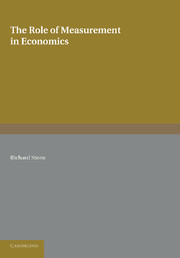Book contents
- Frontmatter
- Contents
- List of Tables
- List of Diagrams
- Preface
- INTRODUCTION
- FOUR ASPECTS OF THE PROBLEM OF MEASUREMENT
- IV Facts and Empirical Constructs
- V Deductively Formulated Theories and their Verification
- VI Postulates for the Theory of Choice
- VII The Estimation of Parameters
- VIII The Nature of Prediction
- IX A Simple Model
- X The Development of a Linear Model over Time
- XI Prediction and Economic Policy
- XII Practical Objections to Exact Models
- XIII Prediction from Static Models
- SOME ILLUSTRATIONS OF THE PROBLEMS OF MEASUREMENT
IV - Facts and Empirical Constructs
from FOUR ASPECTS OF THE PROBLEM OF MEASUREMENT
Published online by Cambridge University Press: 05 June 2016
- Frontmatter
- Contents
- List of Tables
- List of Diagrams
- Preface
- INTRODUCTION
- FOUR ASPECTS OF THE PROBLEM OF MEASUREMENT
- IV Facts and Empirical Constructs
- V Deductively Formulated Theories and their Verification
- VI Postulates for the Theory of Choice
- VII The Estimation of Parameters
- VIII The Nature of Prediction
- IX A Simple Model
- X The Development of a Linear Model over Time
- XI Prediction and Economic Policy
- XII Practical Objections to Exact Models
- XIII Prediction from Static Models
- SOME ILLUSTRATIONS OF THE PROBLEMS OF MEASUREMENT
Summary
It is obvious that there is an enormous amount of descriptive material, sometimes called natural history data, about economic activity in all its forms. A great deal of this will not involve measurement at all, since it will consist of descriptions of the organization and working of institutions and agreements and arrangements of all kinds. In addition to this qualitative descriptive material there is a vast mass of quantitative descriptive material. Part of the latter arises from the labours of bookkeepers, clerks and others engaged in recording, classifying and presenting records of some form of activity. This part of the quantitative descriptive material normally relates to the records of a single organization or concern, though this may of course be very large and have many branches. Another part arises from an attempt to collect information from a number of separate units as exemplified by the greater part of official statistics. Classified and tabulated information of this kind contributes to the body of knowledge known as economic statistics.
In addition to this body of descriptive material, consisting of what I propose to call primary facts, there is on the quantitative side a further type of information which may be called empirical constructs. It may be that from a philosophical point of view these constructs are not to be sharply differentiated from primary facts and that the difference, if any, is only one of degree. By primary facts I mean such things as the originating entries in a cash book or the quantity of some commodity produced over a particular period. It is not as a rule hard to find a definition for items of this kind and the problem of obtaining information about them lies largely in the administrative and technical difficulties of collection. On the other hand there are many items, similar to primary facts in having a counterpart in the actual world, but which are not capable of being apprehended in the same simple manner. These empirical constructs are well illustrated by the example of the income of an individual or a nation. No amount of searching in primary records, that is the originating entries, actual or imputed, in the books of a firm or individual, will enable us to detect the income that has been made.
- Type
- Chapter
- Information
- The Role of Measurement in Economics , pp. 9 - 12Publisher: Cambridge University PressPrint publication year: 2013



